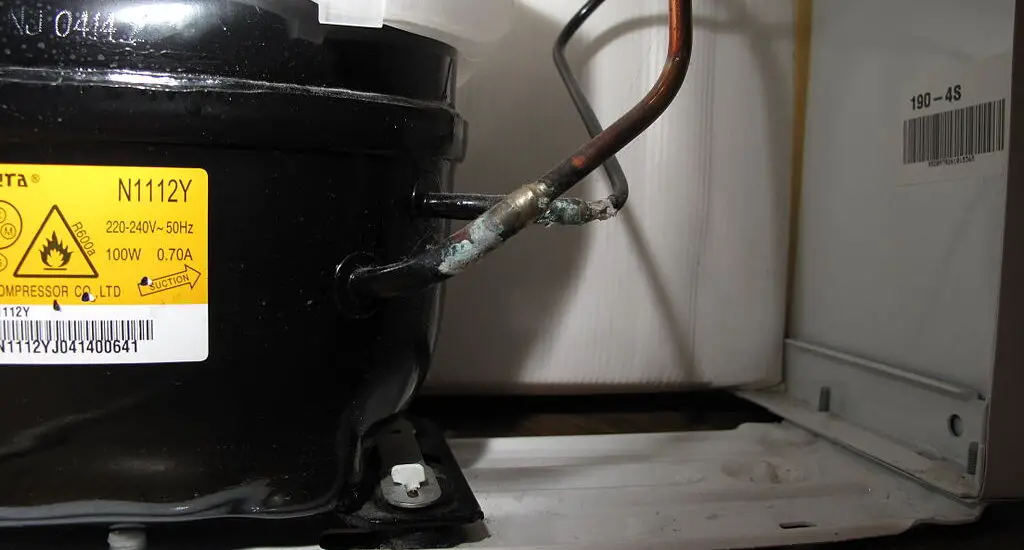Say, “compressor energy efficiency”, and people’s eyes might glaze over, but did you know that understanding and enhancing this very efficiency can save you big bucks in the long run? Let’s make this clear – it’s about your refrigerator and its heart, the compressor. And just like our heart, a well-functioning, energy-efficient compressor keeps things running smoothly and more economically.

Table of Contents
The Role of Compressors in Refrigerators
What does a compressor do in your refrigerator and what amount of energy does it require to function? We’ll answer these questions in this section.
Function of a Compressor in a Refrigerator
Think of the compressor in your fridge like a heart in your body – pumping the lifeblood (in this case, refrigerant) around to keep everything chilled and fresh. It’s the heavy lifter, doing the work so your veggies stay crisp, and your ice cream doesn’t turn into soup.
The Energy Demand of Compressors
Here’s a fun fact for you: In a typical refrigerator, the compressor can account for up to 80% of energy usage. Yup, you heard it right, almost a lion’s share! So, you can see why getting serious about compressor energy efficiency isn’t just an eco-friendly move; it can significantly lighten the load on your energy bill as well.
Understanding Compressor Energy Efficiency
Now that we’ve gotten a basic understanding of the compressor, let’s fix our focus on understanding what compressor energy efficiency is.
Defining Energy Efficiency in Compressors
When we talk about energy efficiency in compressors, we’re referring to the ratio of the cooling effect produced to the energy consumed. In other words, a more energy-efficient compressor provides more cooling while using less power. Sounds good, right?
Factors Affecting Compressor Energy Efficiency
Several factors come into play when we discuss energy efficiency, like the type of refrigerator, the compressor’s design and technology, and even the environment it operates in.
Refrigerator Model and Design
What does your refrigerator look like? Is it a two-door, a French door, or a single door? Each design features a compressor differently, and the way it’s integrated can influence the overall energy efficiency.
Compressor Type and Technology
Then there’s the tech behind the compressor itself. The good old reciprocating compressor? Or maybe the more modern inverter technology? Different types have their own energy efficiency profiles. Choosing wisely can mean the difference between a power guzzler and a lean, mean, cooling machine.
Operating Conditions
Consider your local climate and where you place your fridge. Factors like ambient temperature and humidity can impact compressor efficiency. Yes, even the best compressor might struggle in extreme conditions.
Check out these other related articles...
Efficiency of Compressor Formula: Your Comprehensive Guide
GE Refrigerator Compressor Not Running: Proven Solutions
Refrigerator Compressor Specifications: Your Handy Guide
Will Compressor Run Without Freon? [Answered]
Efficiency of Compressor: A Comprehensive Analysis
Ways to Improve Compressor Energy Efficiency
In this section, we’ll show you how to improve compressor energy efficiency to help you save some bucks.
Selection of Energy-Efficient Compressor Types
With various compressor types out there, picking the most energy-efficient ones can feel like finding a needle in a haystack. Don’t sweat it! Compressors using inverter technology can be a good starting point, thanks to their ability to adjust their speed according to the fridge’s cooling demand.
Optimization of Refrigerator Design and Settings
How about tweaking your refrigerator’s settings for improved energy efficiency? For example, a fridge kept at the optimal temperature range (0 to 5°C for the fridge section, and -18°C for the freezer) doesn’t make your compressor work harder than it should.
Regular Maintenance and Checkups
Lastly, don’t overlook the power of regular maintenance. Keeping your fridge clean, especially the coils at the back, can boost your compressor’s efficiency, just like taking your car for regular services helps keep it in top form.
Impact of Compressor Energy Efficiency on Overall Energy Consumption
Contribution of Compressor Energy Efficiency to Total Energy Savings
Let’s crunch some numbers. Improved compressor energy efficiency can lead to substantial energy savings. Imagine cutting your fridge’s energy consumption by up to 30% with a high-efficiency compressor. Now, that’s a cut in your electricity bill you’ll certainly feel!
Environmental Benefits of Compressor Energy Efficiency
Beyond the savings on your bill, compressor energy efficiency has a broader, greener impact. Lower energy consumption means less power generation, translating into fewer greenhouse gas emissions. So, by opting for an energy-efficient fridge, you’re doing your part for Mother Earth, too.